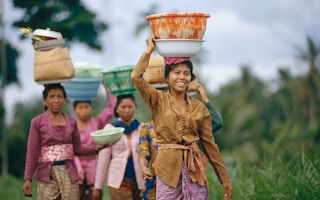Women and young farmers can spur others to implement new sustainability and development initiatives, even though they are less likely to be seen as opinion leaders in their local communities, according to a study.
Women make up 43 per cent of the global agricultural labour force, but face significant discrimination when it comes to land ownership, access to credit and financial services, and participation in decision-making, according to the Food and Agriculture Organization of the United Nations (FAO).
For the study, published this month in the journal Agriculture and Human Values, researchers surveyed about 2,000 farmers on the island of Sulawesi in Indonesia and asked them to identify leaders they would consult for advice and information in their smallholder farming communities.
These leaders, largely older men, were then asked to convince other farmers to use pruning scissors to improve the health of their cocoa trees.
“Correct pruning of cocoa trees can decrease unwanted shading, help control diseases and pests, and limit transfer of nutrients to unproductive parts of the plant thereby increasing the yield of cocoa trees by optimising their growth patterns,” says Petr Matous, the study’s lead researcher from The University of Sydney’s School of Project Management and John Grill Institute for Project Leadership.
Contrary to common perceptions of older men as being the most influential in their networks, it was the randomly selected second group, comprised largely of young farmers and women, that was successful in convincing twice as many of their peers to trial the new scissors.
“Our results perhaps suggest that while women and young people don’t usually occupy formal leadership positions in their communities and are not typically central to information and resource networks that result from roles like heading a farmer group, they may have access to alternative informal networks and capacity that may not be recognised by the broader community,” says Matous.
“Online communication platforms also played a role. When given this rare opportunity, some women and young farmers were able to leverage virtual social networks, which the senior farmers did not do, or not to that extent”, he adds.
“
In smallholder Indonesian farms, there is division of labour between men and women, which differs amongst provinces. Men may take care of a certain crop – rice or maize – that is their main source of income, and women are particularly involved in cocoa farming.
Nadya Aulika Runnisa, inclusive market specialist, Swisscontact Indonesia
In developing countries, women make up on average 45 per cent of the agricultural labour force, ranging from 20 per cent in Latin America to up to 60 per cent in parts of Africa and Asia, according to FAO.
“Social norms, traditions, cultural stereotypes and biases influence who is seen as a source of important advice or an opinion leader in a farming community. Studies from multiple societies have shown that men may be more vocal and visible in their roles, while women’s crucial contributions to smallholder agricultural production can be less appreciated, less rewarded and less visible,” Matous tells SciDev.Net.
Out of 84 global policies and plans to address hunger released between September 2020 and December 2021, only 4 per cent refer to women as leaders who should be part of the solution, according to the NGO Care International.
“In smallholder Indonesian farms, there is division of labour between men and women, which differs amongst provinces. Men may take care of a certain crop – rice or maize – that is their main source of income, and women are particularly involved in cocoa farming,” says Nadya Aulika Runnisa, Inclusive Market Specialist at Swisscontact Indonesia, which organised the Indonesian survey.
Swisscontact Indonesia, an independent non-profit organisation, has been training cocoa farmers in polyculture and agroforestry to improve yields and income, reduce carbon emissions and address climate change challenges.
“Women are very much a part of household farm management and finances and have more say or influence in how the family finances are used for buying seeds or fertilisers, or expanding their farm,” Runnisa tells SciDev.Net. “We provide training to raise awareness about the role of husband and wife in a farming household so together they can envision their goals and increase productivity.”

















